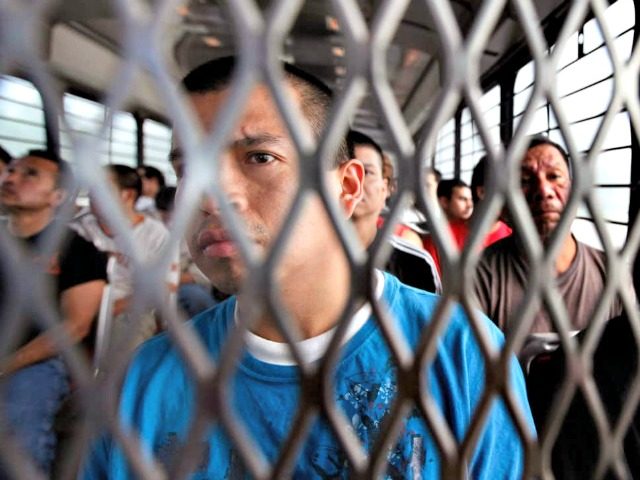President Joe Biden’s order instructing the Department of Homeland Security (DHS) to dramatically cut interior immigration enforcement “will prevent the arrest and removal of nearly all” criminal illegal aliens who would otherwise be arrested and deported by the Immigration and Customs Enforcement (ICE) agency, an analysis finds.
Biden’s order, issued by DHS on January 20, instructs ICE agents to only arrest and deport illegal aliens who are known or suspected terrorists, recent border crossers, or those who have recently been convicted of an aggravated felony — not including those convicted of drunk driving, simple assault, and various drug crimes.
An analysis by Center for Immigration Studies Director of Policy Jessica Vaughan details how the Biden order “will prevent the arrest and removal of nearly all of ICE’s caseload of criminals — including many aliens who have been convicted of the most serious crimes on the books.”
Specifically, Vaughan analyzed ICE deportations from 2018 when more than 95,000 criminal illegal aliens were removed from the interior of the United States.
“If the new Biden deportation policies had been in force and applied to ICE’s 2018 interior caseload, a total of 91,993, or 96.5 percent, would not have been subject to removal,” Vaughan notes. “Only about 3,367, or 3.5 percent, would have been considered appropriate to remove from the country.”
An ICE agent who spoke to Vaughan said that because of the Biden order, they are unable to arrest and deport illegal aliens who have criminal records:
If a sex offender, or gang member, or other felon got prosecuted 11 years ago and got deported, comes back, gets removed again under 1326 [illegal re-entry after deportation, a felony], comes back again and gets arrested for simple theft or DUI, and one of our officers finds him in the jail, even though he is a prior deportee and aggravated felon, because it’s over 10 years old and not related to what he was just arrested for, we can’t touch him. [Emphasis added]
A critical detail of the Biden order is that ICE agents must only arrest and deport illegal aliens who are convicted of aggravated felonies, not those who have been charged with such crimes.
In 2018, nearly 70,000 illegal aliens were deported by ICE who had charges against them — including 10,300 charged with drunk driving, 4,700 charged with traffic violations, 4,700 charged with assault, more than 2,000 charged with drug trafficking, nearly 2,000 charged with burglary, 1,800 charged with domestic violence, 1,500 charged with sexual assault, nearly 800 charged with homicide, and more than 500 charged with lewd acts with a minor. The Biden order would have prevented all of these illegal aliens from being deported.
Another aspect of the Biden order that has crippled ICE agents’ ability to arrest and deport nearly any illegal alien is the requirement that they receive permission for every at-large arrest they make. That permission must come from top ICE officials.
“With locals not cooperating on telling us about releases of deportable criminals we identify, we now need specific written agency approval to make any arrest of an [aggravated] felon once they are released,” another ICE agent told Vaughan. “Even courthouse arrests are considered at large arrests, so we are dead in the water.”
Already, the Biden administration is seeing pushback on its pro-mass migration agenda. Of the 28 executive orders first signed by Biden, six of the nine least popular orders relate to his plans to expand legal immigration to the U.S. and eliminate border controls.
Despite much of the unpopularity for such policies, Biden is considering dismantling more interior immigration enforcement initiatives. For example, the administration is reviewing a plan to end most ICE detention of criminal illegal aliens by cutting off the agency’s ability to have contracts with a number of privately-managed prisons.
John Binder is a reporter for Breitbart News. Email him at jbinder@breitbart.com. Follow him on Twitter here.

COMMENTS
Please let us know if you're having issues with commenting.